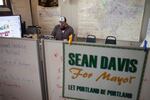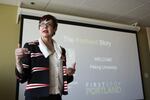
Seven of Portland's 15 mayoral candidates at a forum on April 8, 2016. While Ted Wheeler and Jules Bailey have captured the most attention this election cycle, the 13 others add important perspectives to the campaign.
Rob Manning / OPB
Ted Wheeler and Jules Bailey have spent the most money and captured most of the attention in the race to lead Oregon's largest city.
But 13 other candidates are running, and they're almost uniformly focused on one basic theme: What Portland should become.
Related: Watch: Portland Mayoral Candidates Debate On Think Out Loud
They envision leading a city where you don’t need to spend several hundred thousand dollars to get elected mayor, and where politicians back rent control, fire police officers who use excessive force and strictly limit the number of cars allowed downtown. They see their Portland as a place where the public responds to the growing homeless problem with proactive compassion.
"The first step I would take to ease the homeless crisis is allow people to be stewards of their own community," said Jessie Sponberg, a longtime community activist who camped outside during Portland's Occupy protests and responded to one debate question — Do you prefer pinot noir or pot? — by pulling out his vape pen.
“If we have, the number that’s always thrown around is 3,000 people," he says. "If everybody just took one into their backyard, we’d have none.”
The fear that Portland is on its way to becoming another Seattle or San Francisco is a common one among the second tier of mayoral candidates.

Sean Davis at the American Legion post, which also serves as his campaign headquarters. Davis maintains a vision of how Portland was when crafting a plan for its future.
Bradley W. Parks / OPB
Sean Davis, a military veteran and community college teacher, worries about the working class getting priced out. He suggests special incentives for Portlanders who want to start small businesses or local property owners who want to help prevent gentrification.
"One of the big things we’re working on is a home court advantage policy that will give advantage to Portlanders who want to open up a business," he said. "That also goes for property owners that actually live here in Portland as opposed to people who live out of state or big property management companies.”
David Schor, an assistant attorney general for the Oregon Department of Justice, has proposed an income tax on the city's highest earners. Proceeds from the tax would pay for more affordable housing.
“It’s really really critical that we have a longer-term solution if we actually want to solve this problem," he said. "We have a lot of short-term solutions … But none of those are going to solve this problem if we don’t invest in the long-term solution of true affordable housing.”
Judging from yard signs and endorsements, Sarah Iannarone has come the closest among the non-name-brand candidates to building momentum in the mayor’s race.

Sarah Iannarone speaks at an event in early April. Iannarone has built a campaign based on smarter growth and sustainability.
Rob Manning / OPB
While Ted Wheeler won the endorsements of The Oregonian, the Portland Tribune and Willamette Week, Iannarone captured the backing of the Portland Mercury and the Bike Walk Vote PAC. Her campaign platform is all about smarter growth and sustainability.
"I'm a car-free Portlander, so I get around town on foot," said Iannarone, a cafe owner who also works at Portland State University. "People can't be dying in our streets … We really do need to think about what modes of transportation are we going to prioritize."
We asked almost every candidate for mayor whether there's a part of town that deserves more attention from City Hall. Almost every one gave the same answer, though musician Bim Ditson was the most succinct: "East Portland, because it never got it. I mean, duh."
Other candidates include community access TV host Bruce Broussard, dishwasher and photographer David “The Ack” Ackerman — yes, his nickname is on the ballot — and business employment specialist Deborah Harris. Although none are likely to win, how they do will have an impact on May 17.
To win outright in the primary, a mayoral hopeful must earn 50 plus one percent of the vote. The more serious candidates in the race, the harder that becomes for the front-runners.
This story was reported by Bradley W. Parks, Conrad Wilson, John Sepulvado, Rob Manning and Kristian Foden-Vencil.
